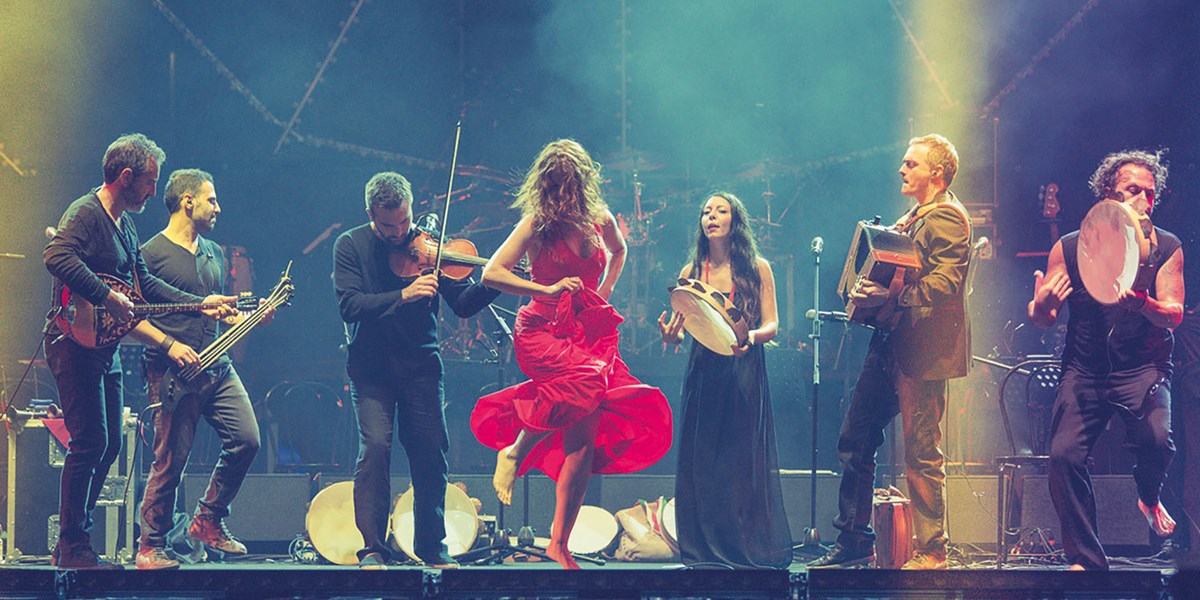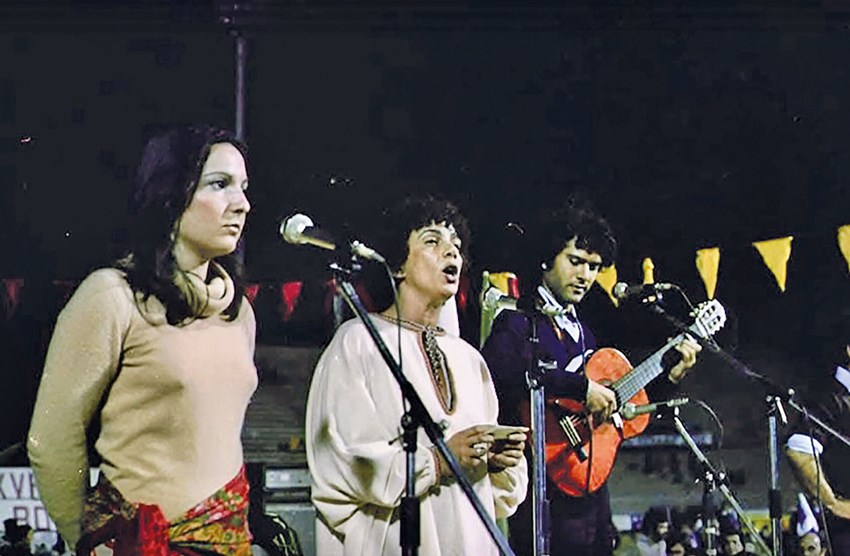Thursday, April 10, 2025
“How am I going to be a legend?”: Canzoniere Grecanico Salentino at 50
Rossella Pinto, one of the original members of Canzoniere Grecanico Salentino, and her son Mauro Durante, their current bandleader, reflect on the group’s 50-year history of preserving and promoting the popular pizzica music of southern Italy

CGS in 2015, Mauro Durante is third left
When we started in 1975, traditional pizzica was declining, and there were various groups all over Italy trying – like Nuova Compagnia di Canto Popolare from Naples and Nuovo Canzoniere Italiano – to develop an interest in the music of the working classes,” says Rossella Pinto, one of the original members of Canzoniere Grecanico Salentino (CGS). “At our first concerts in 1975, people threw stones because they wanted the pop music they saw on TV, not this traditional stuff.”
The driving force was writer/journalist Rina Durante, based in Salento, the ‘heel’ of Italy, who got various musicians to form a group, including Daniele Durante, Pinto’s boyfriend at the time. “I was fascinated by this music, particularly the women’s songs, and I liked singing. Rina Durante was a visionary, but not a member of the group.” Pinto remembers early fights between those who wanted to sing like the portatori, the ‘bearers’, and “others who felt they couldn’t imitate farmers and had to bring their cultural experience as well. We weren’t farmers and couldn’t pretend to be.”

Canzoniere Grecanico Salentino, with Rossella Pinto on the left, in Athens, 1976
Pizzica, a lively dance in 6/8 or 12/8 time driven by large tamburello drums, is the emblematic music of the region. The Grecanico in their name comes from the Griko-speaking minority of the region, there since ancient times. They often performed at La Festa de l’Unità, a festival organised by the Italian Communist Party. After one memorable performance at the celebrated Folkstudio in Rome, RCA asked if they’d like to make an album, but their leftist orientation led them to reject the US label and make their first record with Italian imprint Fonit Cetra instead. In 1976, they gave their first concert outside Italy to 60,000 people in the Panathinaikos stadium in Athens. “It was the period when Inti-Illimani were the most popular band,” Pinto remembers. “And there was great satisfaction because after us there was a group from Chile playing, but people left to follow us after the concert because they wanted our autographs. And going on the bus back to the hotel, people sang with us.”
It was in 2007 that Rossella Pinto stepped down and the group changed from being essentially a family band to a professional one led by her and Daniele Durante’s son, Mauro. The only other family member is the dancer Silvia Perrone, Mauro’s wife. They are celebrating their 50th anniversary with several international concerts, including Songlines Encounters Festival and an exhibition in Melpignano, where the huge Notte della Taranta festival takes place at the end of July.
Most CGS songs are in the Salento dialect, which Durante says is distinct from elsewhere in Puglia. “When they created Italian, they wanted it to be the language of Dante, Petrarch and Boccaccio, and that was the dialect from Tuscany – our other dialects just became dialects.”
To celebrate 50 years, CGS are releasing Il Mito (The Legend). The title-track is a celebrated song written by Rina and Daniele Durante. “Nowadays, Puglia is connected; it’s a tourist destination,” Mauro Durante explains. “But then, living in Lecce, Rina felt isolated and on the periphery, unlike her friends in Rome. ‘Il Mito’ is about living in this land destined to be marginal. ‘How am I going to be a legend?’ she asks. Now, it seems relevant to sing that song because we can be legends. As Lev Tolstoy said, ‘If you want to be universal, talk of your own village.’” Another track on the new album is ‘Dumenica Matina’, about a man going to church on Sunday morning and seeing his love dancing pizzica. With strong vocals, accordion and pizzica rhythms, it’s CGS’ unmistakable soundworld.
Finally, I ask Rossella Pinto if she could ever have imagined that the group would still be going strong 50 years after they started. “Ha, I didn’t expect that. But I am very proud of what Mauro has achieved. It was our dream to take our music to the world and make Salento known all over the world. Our vision and the visibility of our people makes me very happy.”
As told by Simon Broughton

